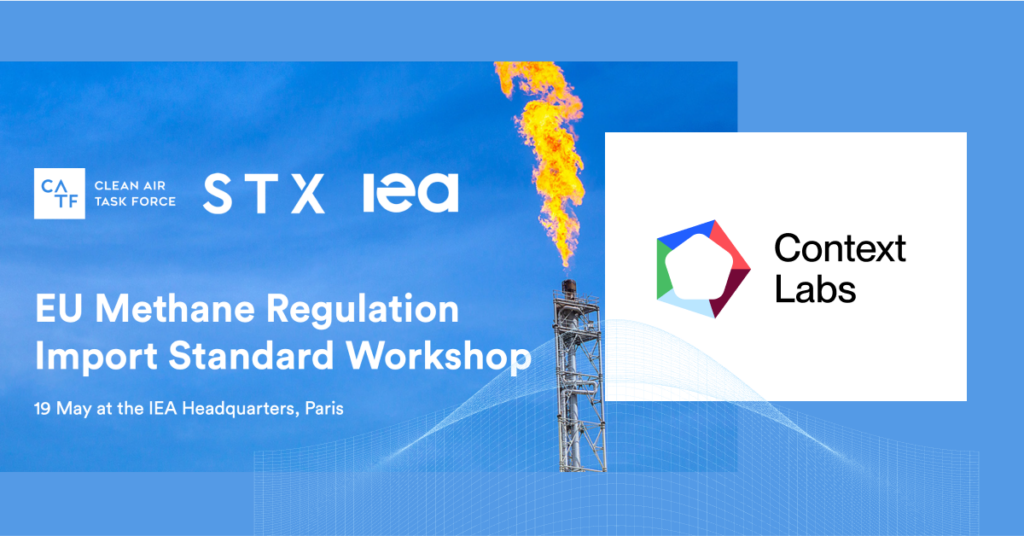This week in Paris, Context Labs participated in a workshop on the EU Methane Regulation (EUMR) Import Standard, to discuss legislation designed to reduce methane emissions from the EU energy sector and associated global supply chains. Organized by the Clean Air Task Force (CATF) and STX Group and hosted by the International Energy Agency (IEA), the summit brought together representatives from the European Commission, EU member countries, oil and gas producers, technology providers and industry experts to discuss implementation details of the new rules.

As 2027 approaches—when importers must ensure all new contracts with non-EU suppliers align with stringent EU MRV measures—Context Labs is uniquely positioned at the intersection of policy requirements and practical implementation. Our participation in this summit demonstrates our commitment to shaping effective compliance frameworks as the industry prepares for these critical deadlines.
The EUMR has the potential to significantly reduce global methane emissions and set an essential international regulatory baseline. But the rule sets challenging requirements. Effective 2027, importers of gas to the EU must demonstrate that their supplies were produced under measurement, reporting and verification (MRV) requirements equivalent to those in the EU, and must also demonstrate that supply chain emissions are under an as-yet-undetermined methane intensity limit.
Europe finds itself in a difficult energy trilemma. The continent must uphold its energy security as it pivots from Russian gas, maintain affordability for its residents, and weigh those priorities against its climate goals. A key discussion topic was how effective implementation of the EUMR can create market incentives for proven and verified low-emission natural gas that will help the EU solve all three problems.
The summit explored ways to track the origin and methane emissions intensity of imported oil and gas, aiming for uniform implementation of the regulation by EU Member States. Participants also discussed market mechanisms, such as trading systems for certified emissions reductions, to enhance the regulation’s environmental impact.
At the summit, Context Labs’ customers Williams Companies and Jonah Energy presented how they use the Context Labs platform to quantify their emissions across a highly complex supply chain. By demonstrating how measurement-informed emissions quantification is possible even in the fragmented U.S. supply chain, these industry leaders showed how technology can help EU policymakers satisfy the complex data requirements in the EUMR.
As part of the discussion, we emphasized the importance of using transparent, traceable data tied to commercial activity—what is called “Trace and Claim.” Unlike “Book and Claim” systems, which allow environmental certificates to be decoupled from actual gas molecules—for example, pairing high-emissions gas from one region with credits from another – Trace and Claim ensures emissions data is directly linked to physical transactions. This reduces the risk of double-counting and maintains a clear chain of custody for environmental attributes.
As part of our contribution, we also reinforced the operational value of high-frequency, asset-level emissions data. Far from being burdensome, real-time emissions tracking can reduce costs and streamline compliance workflows. For example, deployment of Context Labs’ platform across thousands of sites has improved reporting speed, enabled site-level mitigation, and unlocked commercial value through differentiated gas contracts.
Looking ahead, we will continue working with regulators, operators, and industry partners to make the ROI of emissions transparency unmistakably clear—whether in the form of regulatory certainty, reduced operational risk, or market differentiation. We’ll also provide accessible overviews of the technologies we use, including blockchain, focusing on their roles in auditability, provenance, and identity assurance, with privacy and interoperability built in from the start.
Summit participants agreed it was a productive session and plan to meet in person again later this summer. Context Labs will continue participating in these critical regulatory dialogues and advocating for our technology as a pragmatic solution for EU policymakers. As EUMR implementation details emerge through 2025 and beyond, we remain committed to advocating for technology solutions that help the EU meet its ambitious climate goals while maintaining energy security.
Learn More: Achieve Unmatched Accuracy in Product Carbon Footprint Tracking with Context Labs